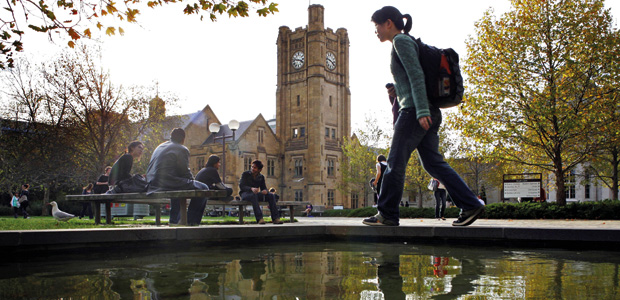
Source: Getty
As the University of Melbourne knows, brand promises make (or break) reputations. Lara McKay explains how Australia’s finest keeps its word.
If you put any group of marketers in a room and ask them to define the difference between “reputation” and “brand”, a vibrant and lengthy discussion would likely ensue. Are they complementary or mutually exclusive terms? Which is of greater significance? Never is this more stark than in higher education, where 100-plus-year-old institutions are comfortable discussing their esteemed reputation but can be unsettled by the notion of the brand.
In Shakespeare’s Othello, Iago declares: “Reputation is an idle and most false imposition, oft got without merit and lost without deserving.” But marketers know that reputation is dynamic, not idle. Universities today must invest in their brand to the same extent as they seek to maintain and improve their reputation.
But what is the difference?
Reputation is, by most measures, what other people think of you, a collective perception often focused on your credibility and the respect of others. Brand, meanwhile, can be considered your character. It is what defines the choices you make and how you communicate, engage, teach and inspire. Often this takes the form of a brand promise – what you seek to do better or more efficiently than others. Setting and delivering on your brand promise makes or breaks your reputation.
University brands are built on a range of factors, such as where an organisation chooses to spend its resources, or how its academics balance research and teaching.
In seeking to define its brand, the University of Melbourne has outlined the challenges it wishes to address. These are global, national and regional – embracing our academic leadership in Australia while projecting our outlook to Asia Pacific and beyond. Known internally as our research “Grand Challenges”, they act as a mechanism to galvanise our research community and send a clear message about our purpose. From climate change to food security, from Australia’s multicultural nature to the rapidly disappearing languages of its first people, these challenges define us, as they will come to define the people we seek to serve.
Projecting our voice globally is a key focus for Melbourne. We are conscious of our geographical status as the natural bridge between East and West and are aware of the appetite for insights into our region.
With this in mind, we seek to identify key outlets to disseminate our stories and work in step with media outlets across the world. With a live-to-air studio on campus, Melbourne maintains regular contact with numerous international broadcasters: its academics appear on the BBC, Al Jazeera, Channel News Asia, Bloomberg and CNBC Asia, among others. Furthermore, Melbourne is a founding partner of (and serves as the headquarters for) The Conversation – a research-led news institution that is now a global champion of academic rigour, scientific enquiry and public debate in the digital media landscape.
Just as important to Melbourne’s success has been our approach to owned media. Creating innovative digital platforms to disseminate content is imperative if we are to tell our stories and demonstrate our academic endeavour and global connectedness. An example of this is the Melbourne School of Government’s creation of two dedicated online platforms, Election Watch and G20 Watch, established over the past two years to provide expert political opinion and analysis.
Election Watch focused on the 2013 Australian election plus the 2014 Indian, Indonesian and Victorian state elections. G20 Watch published independent “explainers” as Brisbane played host to the G20 Summit. The platform had an audience reach of some 230,000 people (when resyndication of content was counted), 92 per cent unaffiliated with the university.
Such platforms disseminate expert commentary from our academics, encouraging debate, scrutinising issues and explaining complex subjects. They operate outside the news cycle yet become part of it. They are a gateway to our brand, illustrating our academic expertise and institutional passion.
This is the Melbourne approach. The way we build our brand and reputation is intrinsically linked to our place and purpose, and a methodical execution of marketing and communications activity amplifies this in the minds of the people we serve.
Defining the purpose of your institution is the key to building a strong brand and reputation, and Melbourne is always seeking new ways to share the stories that underpin this purpose, whether it be excellence in teaching, a particular research focus, a practice area or an institutional partnership. The University of Melbourne has been well served by this approach, and it is one that we will continue to follow: find the thing that makes you unique and pursue it with relentless determination.
Lara McKay
Executive director, marketing and communications, University of Melbourne
The University of Melbourne is hosting the 2015 Times Higher Education World Academic Summit, 30 September to 2 October 2015. You can register here.
Register to continue
Why register?
- Registration is free and only takes a moment
- Once registered, you can read 3 articles a month
- Sign up for our newsletter
Subscribe
Or subscribe for unlimited access to:
- Unlimited access to news, views, insights & reviews
- Digital editions
- Digital access to THE’s university and college rankings analysis
Already registered or a current subscriber? Login